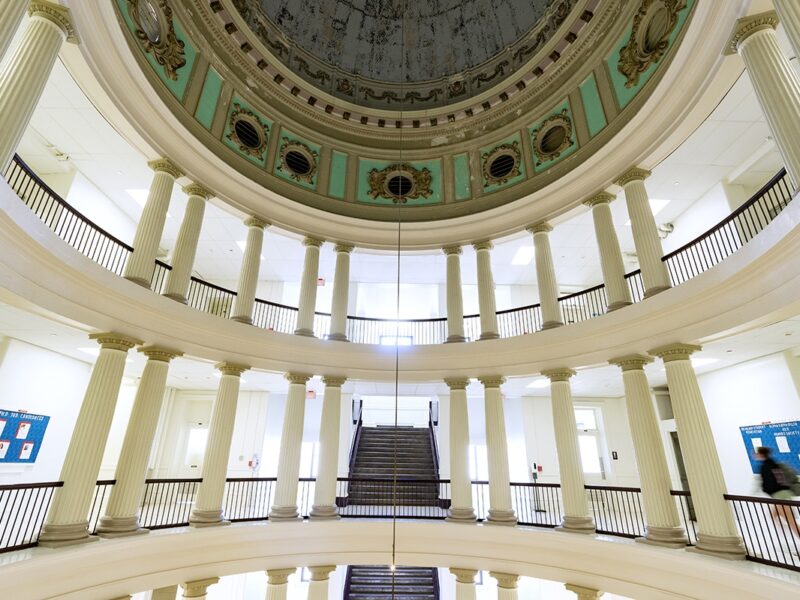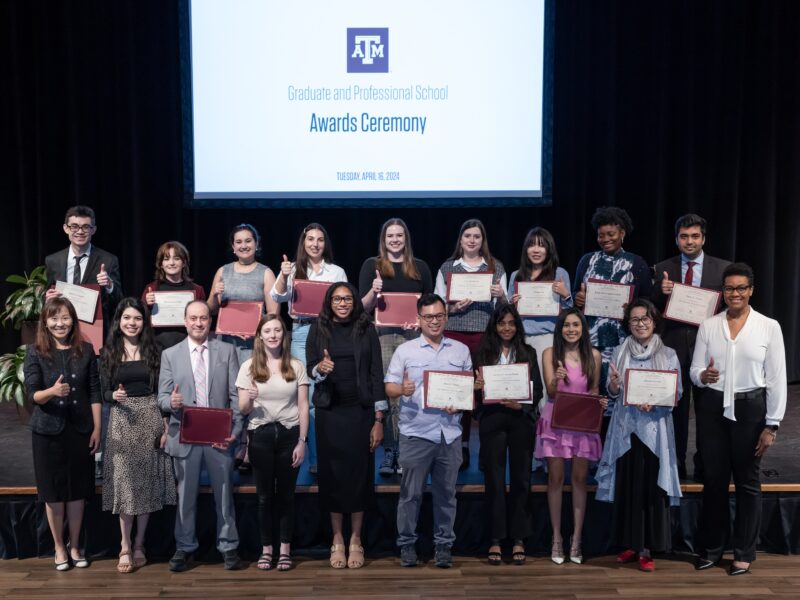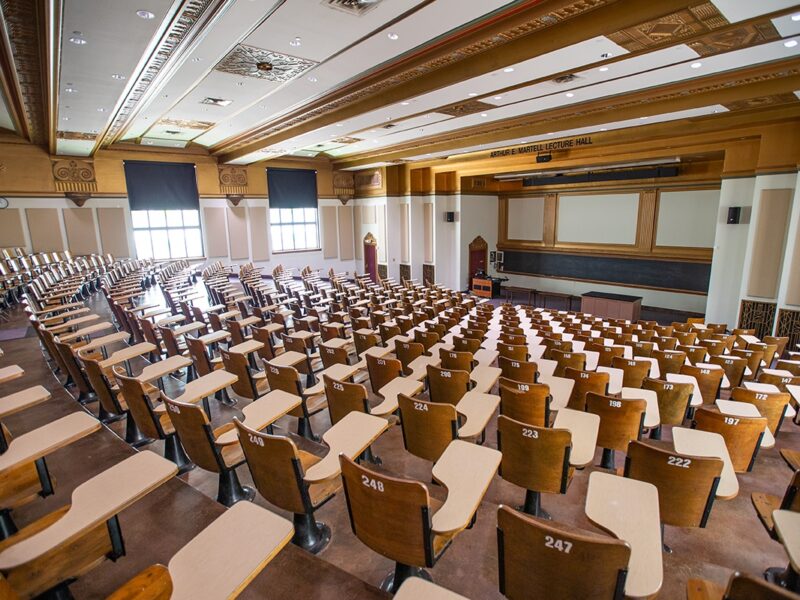Jewish Studies Program To Debut In Spring 2024 Alongside Exciting Offerings

The College of Arts and Sciences invites the campus and community to a Nov. 6 kickoff event celebrating a noteworthy first — the creation of a new Jewish Studies program at Texas A&M University, to be housed within the Department of Global Languages and Cultures.
No tickets or registration is required for the free public event, which will feature an afternoon symposium and evening keynote lecture marking the culmination of a multi-year effort by professors, staff and donors to launch the program’s first course offerings in the spring 2024 semester.
The Jewish Studies program is due in large part to Donald Zale ’55 and Gerald Ray ’54, both Texas A&M former students and members of the Corps of Cadets. They have remained friends ever since. Zale and Ray envision great potential for Texas A&M to host a Jewish Studies program as one of the largest universities in the United States.
“Texas A&M University has one of the best populations of friendly students who lead by example,” Zale said. “It’s a perfect place for Jewish students and for the families of Jewish students. It’s gratifying for me to see this program start. Hopefully, it will attract more Jewish students to the university.
“I bleed maroon and white. I’ve been an Aggie since 1951. I’m 90 years old, and I’ve traveled all over the country and many parts of the world. It is just different at Texas A&M. There is a spirit here and a unique definition. It’s a welcoming environment, and I think we need to expand the opportunities.”
Ray and Zale entrusted Dr. Ashley Passmore, an instructional assistant professor in Global Languages and Cultures who serves as the program’s coordinator, to advocate for the establishment of the Jewish Studies program — a process that took six years of groundwork and research.
“As an educator, I’m excited to have the resources of a formal Jewish Studies program to elevate people who are working in this field and get them the visibility they otherwise wouldn’t have,” Passmore said. “This is not necessarily just for Jewish students. In fact, it’s for people of all backgrounds. On Nov. 6, we wish to engage students and faculty in conversation on contemporary research at Texas A&M in the field of Jewish Studies. We invite students to consider taking new classes being offered in Jewish Studies or to become a Jewish Studies minor.”
Passmore noted that the symposium will showcase the depth and breadth of the Jewish Studies research already underway at Texas A&M, with an emphasis on its global scope and multidisciplinary nature. Scholars will present as part of two sessions from 1:30 p.m. to 5 p.m. Each session will be followed by a question-and-answer opportunity. The evening will conclude with a keynote lecture by Dr. Victoria Aarons at 5:45 p.m. Aarons, who holds the O.R. and Eva Mitchell Distinguished Professor of Literature at Trinity University, is an esteemed scholar in the field of American Jewish and Holocaust Studies. She has written more than 90 scholarly articles and authored or edited 12 books.
Nov. 6 Symposium Schedule At A Glance
1:30 p.m.-3 p.m.
“Ethical Lessons of Holocaust Research”
Melbern G. Glasscock Center for Humanities Research Glasscock Library (GLAS 311)
Featuring Drs. Joe Golsan, Adam Seipp and David Brenner
3:30 p.m.-5 p.m.
Melbern G. Glasscock Center for the Humanities Research Glasscock Library (GLAS 311)
“Crossroads of Hispanic and Jewish Studies”
Featuring Dr. Esther Quintana, Gabrielle Lyle and Jillian Glantz
5:45 p.m.-6:45 p.m.
“Generations of Memory in Holocaust Graphic Novels”
Harrington Education Center Classroom Building (HECC 108)
The Jewish Studies minor will offer courses and programs for students to “study Jews and Judaism within the broader context of dominant societies and the spectrum of the arts, humanities and social sciences.” One new course offering for the spring 2024 semester will be Introduction to Jewish Studies (JWST 201), taught by Brenner.
“For me, this program is the fulfillment of a dream,” Brenner said. “Not only am I an educator who is originally from this part of Texas, but I am also a scholar who has been working at the intersections of humanities and Jewish Studies for nearly three decades now. The study of the Jewish people throughout history offers us useful tools for understanding other members of societies in which Jews have lived. In this inaugural course of the new Jewish Studies minor, students will explore Jewish history, culture and identity throughout the millennia and in the modern world. Like the Jewish Studies minor itself, the course is open to students from any major.”
Another course offering for spring 2024 will be Representations of the Holocaust (GERM 441), taught by Passmore and exploring innovative representations of Holocaust experiences and memories in multimedia forms, ranging from pop-up monuments to virtual spaces like gaming platforms. Both courses will give students priority consideration for a study abroad trip to Vienna and Budapest during spring break 2024. Students will visit significant Jewish heritage sites, museums and synagogues, and engage in academic discussions to foster a holistic appreciation of the Jewish experience in Vienna and Budapest to deepen their understanding of Jewish history, traditions and contributions.
This is only the beginning, according to Passmore. Future courses in the Jewish Studies program will focus on cinema, philosophy, archaeology, communication, Hebrew and much more. In addition, the Jewish Studies minor may be paired with a variety of majors for students who wish to pursue professional careers in law, medicine, journalism, business or other areas. Additional plans for the program include ongoing seminars, research clusters, expanded experiences abroad for students, working groups and guest lectures from visiting scholars.
“The vision of the program is to create a space for diverse interests across disciplines that are connected to the wider idea of Jewish Studies to come together,” Passmore said. “I’m really excited about the possibility of our Jewish Studies program having connections with other research institutes around the world. Naming something as a research and knowledge entity creates a new foundation for growth. We’re such an internationally connected university that it makes sense that an incredibly international population, history and culture should also be part of our knowledge and identity.”
Media contact: Shana K. Hutchins, shutchins@tamu.edu





